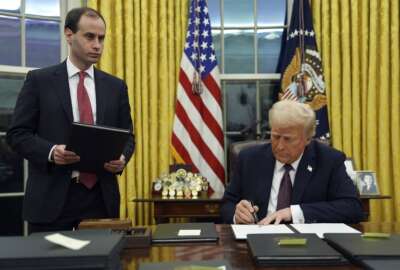Recent research says there will be 3.5 million cyber job vacancies by 2021 across the United States.
When you just look at the federal government, the need for cybersecurity experts, both offensive and defensive, will continue to grow every month, every year.
One way to address this ever-growing need for people with this cyber skillset is to get the next generation of employees interested and excited about cybersecurity.
And that is why competitions such as the National Collegiate Cyber Defense Competition are so important to training and preparing for the cyber threats of today and in the future.
For a second year in a row, a team of students from the University of Virginia won the NCCDC, which is sponsored by Raytheon and a dozens of other public and private sector organizations. And just as important, the cyber defense competition is opening the door a bit wider for how to attract cyber workers of the future.
Take Mariah Kenny, who graduated this spring from the University of Virginia. The competition helped her understand the pace and excitement of protecting networks. She now has a job in the cyber industry.
Roman Bohuk said he came into the competition with a limited knowledge about cybersecurity, and he found the action of defending a network and the stress it brings appealing.
As part of wining the competition, the team received an inside look at the government’s cyber efforts. The students met with the Defense Department’s chief information officer’s office, the Homeland Security Department’s Cyber and Infrastructure Security Agency (CISA), the FBI, the CIA and the Defense Advanced Research Projects Agency (DARPA).
“I think many people think of the government as a monolith organization and think about it very abstractly. But getting to meet the people who do the work on a daily basis and getting to see the challenges they face and places they work and the things that really interest them was really grounding and pretty motivating actually. It was a really valuable experience and personalize what the government does, and showed me what opportunities are available,” said Jack Verrier, another team member.
Jake Smith said by visiting all the agencies he learned just how advanced the government is in defending networks and understanding the current and emerging threats.
Other team members said meeting with the agencies opened their eyes to a career in government.
Sam Spelsberg said the fact that the government experts he met is driven by the mission makes a potential career in government attractive.
“It was really inspiring to put a face to these names and personalize the government was really important. You could see these people working on these specific projects are not just stagnant in what they are doing to maintain the status quo. They are excited about innovation and the next level of technology whatever that may be in their field,” said Caroline Linkous.
National Collegiate Cyber Defense Competition Overview
Things are on fire. They are in your systems. That is not a question, it’s what are you going to do about it? One of the things we learned is that defending a network isn’t all just about those technical skills you have, but also working with the team around you to solve those problems and make sure you are maintaining that communication so things don’t break down.
Mariah Kenny
Team Captain, National Collegiate Cyber Defense Competition Champions from the University of Virginia
Post-Competition Experience
National Collegiate Cyber Defense Competition Champions from the University of Virginia
Sam Spelsberg
National Collegiate Cyber Defense Competition Champions from the University of Virginia
Listen to the full show:
Copyright
© 2025 Federal News Network. All rights reserved. This website is not intended for users located within the European Economic Area.






